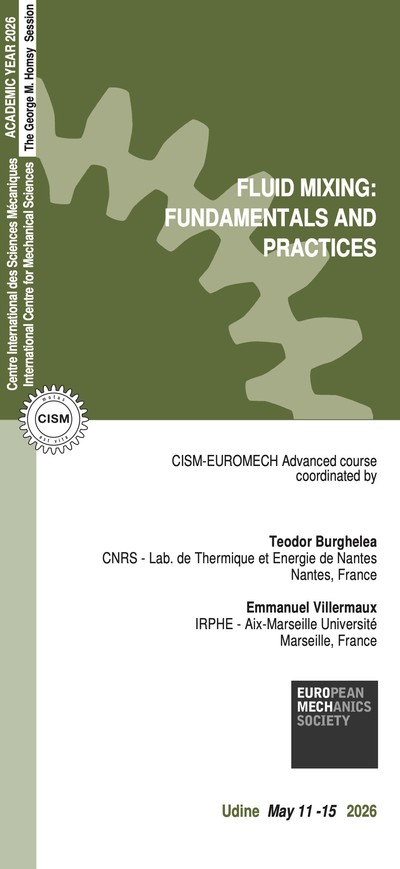Plants offer some of the most elegant applications of Mechanics to be found in Nature. Wind-induced leaf fluttering, waves on wheat crops or seed dispersal by the wind are well-known illustrations of the interaction of plants with an external flow. Mechanics play also a central role in the physiology of plants. Terrestrial plants and trees are hydraulic machines that take water deep into the soil to raise it to the leaves through osmosis and evaporation. The motor of plant growth and movement results from a balance between the mechanical stresses in the cell wall and the water pressure inside. All these external and internal forces are perceived by plants and participate in their development and their morphogenesis. Understanding these functions is of crucial importance for a better management of agriculture or to forecast plants behavior in this period of rapid environmental changes.
The objective of this CISM International Summer School is to provide an introduction to Plant Biomechanics at all scales, from the cellular and tissue level to the whole plant and ecosystem level. Lectures will combine concepts from plant biology (anatomy, physiology) and continuum mechanics (elasticity, plasticity, fluid mechanics, rheology, instabilities, modeling). Due to the interdisciplinary nature of the course topic, and, consequently, of the expected audience, a great attention will be paid on introducing biological and mathematical concepts at the basic level first, before going deeper in the description and eventually reach research topics.
The school will be composed of 6 lectures given by world-renowned experts covering all the main aspects of plant biomechanics. Time will be allocated during the week for attendees to present their own research work through short talks. The first two lectures will deal with the mechanics of plant growth and morphogenesis. Anja Geitmann (McGill, Canada) will focus on the cellular level and give the basic notion of biology needed for the rest of the course, while Oliver Jensen (Manchester University, UK) will describe different aspects of the modeling of growing plant tissues.
Two lectures will then address plant fluid mechanics. Missy Holbrook (Harvard University, USA) will be in charge of describing internal flows (sap ascent, sugar transport) and Emmanuel de Langre (Polytechnique, France) will discuss the interaction of plants with an external flow.
The last two lectures will discuss plant biomechanics in the broader perspective of plant ecophysiology and evolution. Bruno Moulia (INRA, France) will give a lecture on how plants respond and adapt to their environment, with a focus on tree biomechanics, while Karl Niklas (Cornell University) will address the global biomechanical constraints that shaped plant structure and function through evolution.
The targeted audience for this Summer School will be PhD students, postdoctoral, and young researchers in departments of Physics, Biophysics, Biology, Applied Mathematics, Engineering and Agricultural Sciences.
A. Geitmann, J.K.E.Ortega, Mechanics and modeling of plant cell growth. Feature Review. Trends in Plant Science 14: 467-478 (2009).
A. Geitmann, R.Dyson, Modeling of the primary plant cell wall in the context of plant development. In "Cell Biology", S. Assman, B.Liu (eds), Series "The Plant Sciences", Tester M, Jorgensen RA (eds) (2014).
O.E. Jensen, J.A. Fozard, Multiscale models in the biomechanics of plant growth. Physiology 30, 159-166 (2015).
A. Goriely, The Mathematics and Mechanics of Biological Growth. Springer-Verlag (2017).
Jensen, K.H., K. Berg-Sorensen, H. Bruus, N.M. Holbrook, J. Liesche, M.A. Zwieniecki and T. Bohr, Sap flow and sugar transport in plants. Reviews of Modern Physics 88(3) (2016).
A.D. Stroock, V. Pagay, M.A. Zwieniecki, N.M. Holbrook, The physicochemical hydrodynamics of vascular plants. Annual Review of Fluid Mechanics 46, 615-642 (2014).
E. de Langre, Effects of wind on plants. Annu. Rev. Fluid Mech., 40, 141-168 (2008).
V. Nikora, Hydrodynamics of aquatic ecosystems: an interface between ecology, biomechanics and environmental fluid mechanics. River Research and applications, 26(4), 367-384 (2010).
B. Moulia, C. Coutand, J.L. Julien, Mechanosensitive control of plant growth: bearing the load, sensing, transducing, and responding, Frontiers in Plant Sciences (Plant Physiology) 6 (52): 1-20 (2015).
O. Hamant, B. Moulia, How do plants read their own shapes? New Phytologist (Tansley Insight). 212 333-337 (2016).
K.J. Niklas, Plant Biomechanics: An Engineering Approach to Plant Form and Function. University of Chicago Press. Chicago (1992).
K.J. Niklas, K. J. Plant Evolution: An Introduction to the History of Life. University of Chicago Press (2016).
6 lectures on: Plant interactions with Fluids.
Introduction to plants and ecological systems under flow from individuals to canopies, relevant dimensionless numbers, effect of plants on natural flows, plant motion and vibration mechanics, effect of wind on plants, fully coupled models of wind-plant interactions, aquatic plant-flow interaction, biomimetics, visual rendering of plant motion, interaction with other loads (snow).
5 lectures on: Biology and Mechanics of the Plant Cell.
General concept of mechanical modeling in biology; anatomy and biology of plant cells; biochemistry of the cell wall; cell wall mechanics and rheology; cytoskeleton and intracellular transport; water relation (osmotic potential, turgor pressure); mechanics of plant cell growth; plant cell morphogenesis and differentiation; quantitative experimentation in cell mechanics.
6 lectures on: Vascular transport in plants.
Cavitation and metastable water, cell wall reinforcement and xylem tension, pit membrane structure and embolism propagation, water transport in roots and leaves, phloem loading and sieve tube structure, water movement between xylem and phloem.
6 lectures on: Theoretical tools and concepts for modeling growing plant tissues.
Constitutive models and elasto-visco-plasticity; mechanics of heterogeneous anisotropic materials; computational methods for multicellular tissues; the plant cell wall as a cross-linked fibre-reinforced material; growth via anisotropic cell elongation; upscaling from cells to tissues; applications to root growth.
6 lectures on: Plant Response to Environmental Stimuli: from Biomechanics to Mechanobiology.
Growth kinematics and dynamics at the organ level, incompatible autostresses in fluid and solid phases as motors of plant growth and posture control, mechano- and gravi-sensing in plants: cellular mechanisms and global control (gravi- and photo-tropism), thigmomorphogenesis, modeling in biomechanics and mechanobiology.
6 lectures on: The Evolution of Plant Biomechanics.
Plants shape/structure/function across evolution, from algae to land plants to wood. Global physical constraints on plants (elasticity, hydrodynamic, diffusion), the unicellular to multicellular transition, the water to air transition, the non-vascular to vascular transition, the primary to secondary growth transition, scaling relations and allometry, genetic algorithm and modeling.
The registration fee is 600.00 Euro + VAT*, where applicable (bank charges are not included). The registration fee includes a complimentary bag, four fixed menu buffet lunches (on Friday upon request), hot beverages, downloadable lecture notes and wi-fi internet access.
Applicants must apply at least one month before the beginning of the course. Application forms should be sent on-line through the following web site: http://www.cism.it. A message of confirmation will be sent to accepted participants. Applicants requiring assistance with the registration should contact the secretariat at the following email address cism@cism.it.
Applicants may cancel their course registration and receive a full refund by notifying CISM Secretariat in writing (by email to cism@cism.it) no later than two weeks prior to the start of the course.
Cancellation requests received during the two weeks prior to the start of the course will be charged a 50.00 Euro handling fee. Incorrect payments are also subject to a 50.00 Euro handling fee.
A limited number of participants from universities and research centres who are not supported by their own institutions can be offered lodging and/or board, if available, in a reasonably priced hotel or student guest house.
Requests should be sent to CISM Secretariat by May 8, 2019 along with the applicant's curriculum and a letter of recommendation by the head of the department or a supervisor confirming that the institute cannot provide funding. Preference will be given to applicants from countries that sponsor CISM.
Information about travel and accommodation is available on the web site www.cism.it, or can be mailed upon request.
* Italian VAT is 22%.





